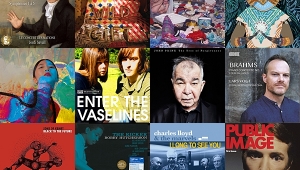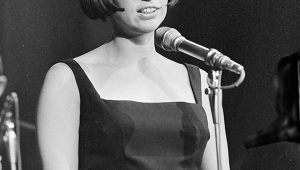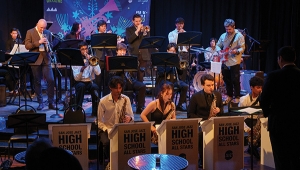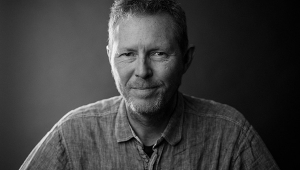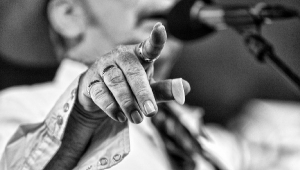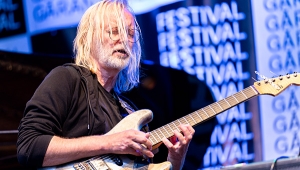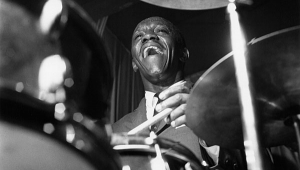| Columns Retired Columns & Blogs |
Attention Screen: The Making of Live at Merkin Hall Page 2
"Attention Screen is an attempt to do collectively in real time what a single composer does over a much longer period," explains Bob Reina. "To do that, we have to listen very carefully to what the other three guys are doing, and we have to react immediately to everything we hear to move the piece in a different direction. It's satisfying, but it's also a nerve-racking process."
In 1968, I ran into Steve Lacy on the street in Rome. I took out my pocket tape recorder and asked him to describe in 15 seconds the difference between composition and improvisation. He answered: "In 15 seconds, the difference between composition and improvisation is that in composition you have all the time you want to decide what you want to say in 15 seconds, while in improvisation you have 15 seconds." His answer lasted exactly 15 seconds and is still the best formulation of the question I know.—Frederic Rzewski, Listen to Lacy
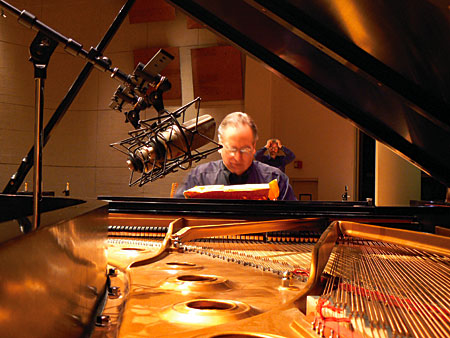
That sense of "stepping out of one's self," of awakening to the fact that "we're here," is precisely what bothers some folks about improvisation. In Derek Bailey's Improvisation, composer Gavin Bryars said that he's uncomfortable with improvisation because "distancing yourself from what you are doing is impossible with improvisation. If I write a piece, I don't have to be there when it is played."
Don Fiorino doesn't see that as a plus. "The engagement of the audience is part of the creative process, becoming another element in the improvisation—the audience acts as receptors, providing energy and a kind of telepathic feedback. If we're amusing ourselves but losing the audience, we're not completing the circuit."
Chris Jones agrees that audiences aren't just passive consumers. "Improvisation can be more difficult for the 'end-user,' the listener, than other types of music, which get edited, either in the composing or after the fact, in the recording. Listening to improvised music requires commitment on the part of the listener."
Music . . . cannot exist unless at least some human beings possess, or have developed, a capacity for structured listening. Musical performance, as distinct from the production of noise, is inconceivable without the perception of order in sound.—John Blacking, How Musical Is Man? , p.10
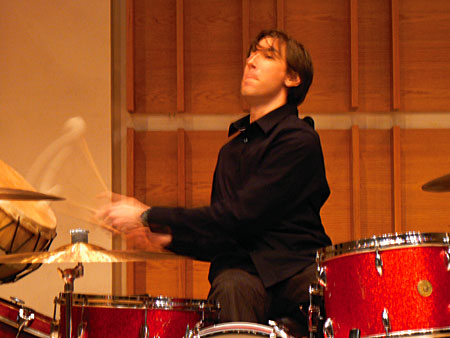
Chris Jones also thinks Bryars is wrong about the impossibility of being both present and not present in the act of creation. "You can't consciously experience an unconscious thing. I can perform music and I can have a transcendental experience while I'm doing it, but I'm never aware of it while it's happening. It's only after the fact that I say to myself, Wow, you really weren't there for a while—welcome back. And it happens for me more with rhythmic things than harmonic things, especially when I'm deep in a groove with Mark."
Reina, too, has experienced that shift of perspective during Attention Screen performances. "At Merkin, we achieved that state that Blair Tindall described in Mozart in the Jungle: Sex, Drugs, and Classical Music. She said performing before a receptive audience was 'filled with joy and experience . . . [a sensation] I believed might be specific to making music. . . . It's as addictive as a drug.' That's what the entire concert at Merkin was like for us. It's the best we've ever played. We were grooving the entire time; we were grokking each other the entire time—and hopefully, we'll do that the next time we play, and the time after that and the time after that."
Talk to the members of Attention Screen and you're likely to hear more about the abilities of the "other" guys than you are to hear much about "I." That level of mutual admiration and trust may be why the band is so much more enamored of improvisation than Bryars, who said, "I got no more out of it than I brought to it. I was limited by my own personality and that of the people I was playing with."
"Those guys are monsters," Reina says. "Don is the only heavily amplified electric guitarist I know who has impressive chops in his right hand. Chris and Mark have been playing together since they were teenagers, and they're almost telepathic the way they lock together. I like to describe myself as the least talented member of the band—and that's not false modesty."
"Bob's piano is the only truly stable element in our mix," counters Jones. "That makes it the sonic cornerstone. Don plays all these different instruments, and I change my sound with effects and by playing different basses—even Mark can bring different drums to the gigs, or change the sound with different sticks or mallets. Bob's our constant."
"Bob brings an unbelievably broad range of genres to the band," adds Fiorino. "The fact that he also plays guitar means he understands where I have to go when I'm playing."
"Are you kidding?" Reina says. "Nobody ever knows where Don is going to go. You just fasten your seatbelt and follow as well as you can!"
To go beyond is as wrong as to fall short.—Confucius, Analects
But isn't there inherent risk involved in making it up as you go along? As rich as the rewards are, aren't some avenues best left unexplored?
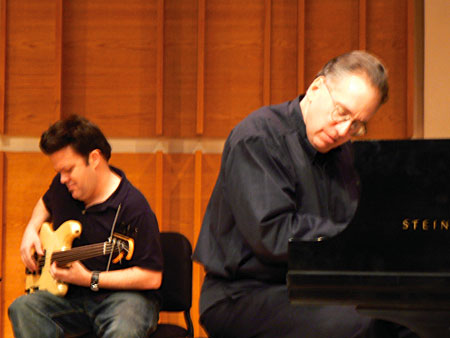
"Who am I to judge?" asks Jones. "It's a democratic process, although that doesn't mean we don't play politics. I'm pretty optimistic, so I'd try to support the other members as best I could. There are times when someone might make a strong argument that I'm not that comfortable with, but who am I to say it's wrong? My intent is to make everything sound like we mean it, but I can always just lay out. We have some unwritten codes, and if several musicians go silent, it could mean they're giving you the spotlight, but sometimes it means they have nothing to add."
Rests always sound well.—Arnold Schoenberg
Flynn definitely agrees. "The other side of active listening is there are times when I'm not in the moment and those are times when the best strategy is for me to just lay out. By not playing, I might hear deeper into what's going on, but it also might be a signal that I have nothing to add to that idea. I feel as though I might be the one who lays out the most."
"Silence plays a big role in our music," says Reina. "We're trying not to be busy. Frequently one of us just lays out—and we've played as a trio many times. I'm a huge fan of George Crumb, and Crumb uses silence a great deal. I use it for another reason as well: I really like the other guys as players, and if I lay out, I can just listen to them for a while."
Don Fiorino concurs. "At some point in every song we do, each one of us is laying out and just listening to the others." That's mostly for the joy of hearing his fellow bandmates. When it comes to shifting focus, he has another strategy: "What I do is radically shift a pattern or tempo in a way that will catch the other players' attention. It's not so much 'leading' as it is signaling that it's time for a change. The other players do that too, if they think I might be going on too long with an idea. With Attention Screen, that isn't much of an issue, because none of us are really going off into that deep void where you tune out everybody else. That's when you have a problem—when one member thinks what he's got to say is more important than the contributions of the rest of the quartet."
In all its roles and appearances, improvisation can be considered as the celebration of the moment. And in this, the nature of improvisation exactly resembles the nature of music. Essentially, music is fleeting; its reality is its moment of performance. There might be documents that relate to that moment—score, recording, echo, memory—but only to anticipate or recall it.—Derek Bailey, Improvisation, p.142
When you hear music, after it's over—it's gone, into the air. You can never capture it again.—Eric Dolphy, Last Date
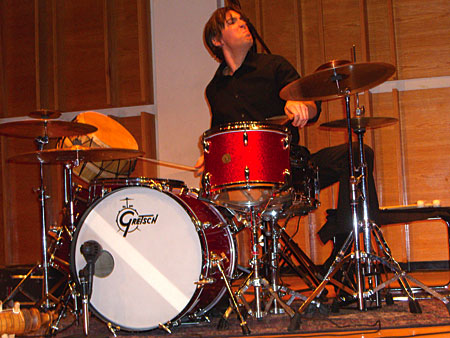
Fortunately, this disc proves that you can make it new every time out and capture it. The music Attention Screen made on February 10, 2007, at Merkin Concert Hall at Kaufman Center, in Manhattan, has been preserved in the reality of its performance. Make no mistake—this is that music, presented almost in its entirety. Seven songs and a sound check were performed and recorded that evening, and Live at Merkin Hall contains six of them as they were played that night. The Compact Disc's data-storage limitations dictated that one song and the song-fragment that was the sound check had to be voted off the disc. (The band had less than five minutes to check levels before the audience was allowed into the hall.)
What you hear here is essentially what you would have heard then—engineer John Atkinson made minor adjustments in level, but the songs were not edited or re-created in the studio. This recording delivers on Attention Screen's promise to go out "there" and dance on the precipice that separates order from chaos. Most of us, if we get there, close our eyes and pray. Attention Screen dances joyfully—and then they leap.—Wes Phillips
- Log in or register to post comments
